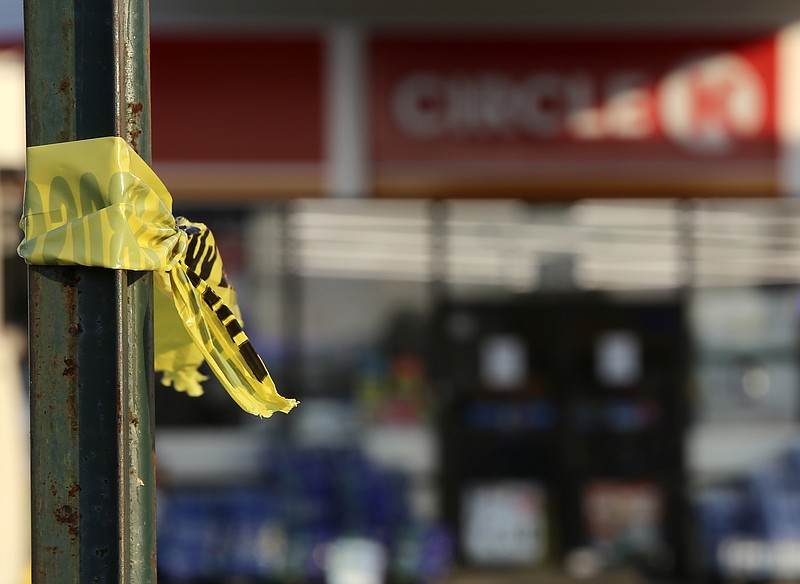As Chattanooga's Police Advisory and Review Committee began hearing its first cases of alleged police misconduct, a group of local activist organizations began its effort to put legislation for a different review board on the ballot in the March 2021 election.
The current board was formed in 2019 after a series of allegations of police brutality and misconduct. It serves as an investigative entity to review all Chattanooga Police Department internal affairs investigations.
How it works
During an internal affairs probe, investigators prepare a report that is then reviewed by the accused officer's chain of command. With each review, a recommended outcome - sustained, not sustained, unfounded or exonerated - is recorded in the officer's internal affairs file.
Once the chain of command has finished its review, the case goes to the citizen advisory committee, and each of its nine members signs off on whether they agree or disagree with the chain of command recommendations or if they want the issue to be investigated further. Then the case goes before the police chief, who has the final say in each case.
If the advisory committee disagrees with the police chief, members can conduct their own investigation. However, because of state legislation passed in 2019 to regulate police oversight boards, the committee does not have subpoena power, meaning it cannot compel witness testimony. But the Chattanooga City Council does have that ability.
Community Control Now
Since the Police Advisory and Review Committee's inception, activist organizations have said the group lacks true, independent oversight. The members are picked by the council and "trained" by the police chief, something the groups believe is a conflict of interest.
The training mandated by the City Council's current ordinance is participation in the police department's Citizens' Police Academy, a program that teaches civilians how law enforcement works. The ordinance also states that the police chief can ask for other types of training - ride-alongs, use-of-force exercises, open records laws and other legal issues - if necessary.
Community Control Now, the coalition of activist organizations - including Concerned Citizens for Justice - has drafted its own legislation for a board it hopes to pitch to voters in the March 2021 election.
In order to put the proposed legislation on the ballot, the group would need at least 4,791 signatures, according to its website. The Hamilton County Election Commission gave the coalition the green light to collect signatures in October. The deadline to do so is Dec. 2, according to the election commission.
It's not clear how many signatures the group has collected, but Ethan Mills, of Community Control Now, said in an email that "more and more signatures keep coming in from across the city every day."
"We can say that there has been tremendous support. We already have several thousand signatures collected."
If enough signatures are collected and voters choose to adopt the legislation, it will replace the Police Advisory and Review Committee entirely.
The proposed board
According to the Community Control Now website, the new board - called the Chattanooga Community Control Board - would have "independent authority to subpoena witnesses, establish public reports and issue findings of fact related to police misconduct."
Mills later clarified that the language in the proposed legislation since has been revised - although it had not been updated on the website as of Friday - to reflect that the board cannot have subpoena power. Instead, it would have to rely on the council to issue subpoenas, much like the current committee.
The election commission approved the revised version, Mills said.
Under the proposed legislation, the board would have the authority to either review cases once the police department's internal investigation is complete or conduct its own investigation parallel to the internal investigation and any criminal investigation. That is, unless it is asked to put its investigation on hold by a court order.
Now, if a criminal investigation is underway, the police department's internal investigation must be put on hold until the criminal case is closed. That's because during internal investigations officers are required to provide information or face termination.
That would mean that anything the officer told investigators could not be used in the criminal case because, according to the 1967 U.S. Supreme Court ruling in Garrity v. New Jersey, the threat of loss of employment can be interpreted as a violation of the constitutional right against self-incrimination, and the criminal case would fall apart.
Therefore, the criminal investigation takes priority.
As for who would serve on the board, members would be nominated by local nonprofit organizations, and each would still have to be approved by the City Council.
The draft legislation also calls for money to be allocated in the city's budget for its operating expenses, including board member compensation. (Members of the current committee are not paid.)
And it calls for a one-time $1 million appropriation to cover "initial costs and expenses related to the hiring and training of employees and board members, secure necessary infrastructure and equipment, conduct a public awareness campaign and otherwise implement the requirements of this ordinance."
As for training, the draft legislation does not specifically define how members would be trained but states that training will be "predominantly obtained from such independent, third party bodies or institutions that have experience with regard to internal affairs and civilian review investigations and audits."
The proposed ordinance requires more frequent and public reports than the current legislation. As it stands now, the committee is required only to compile a comprehensive report "at least annually" detailing summaries of citizen complaints and comparisons of the committee's findings to those of the chain of command and police chief.
Community Control Now's version calls for semi-annual reports and to hold public meetings.
As for who gets the last say in disciplinary outcomes, the draft ordinance states that "absent clear error, the chief of police shall accept those findings of fact" and "shall make all disciplinary decisions based on the board's findings of fact."
Contact Rosana Hughes at rhughes@timesfreepress.com.
